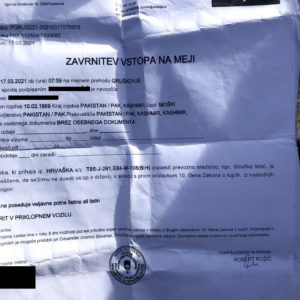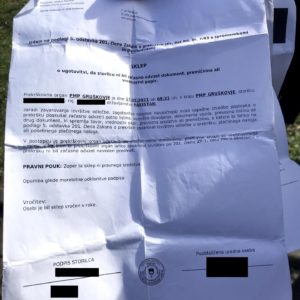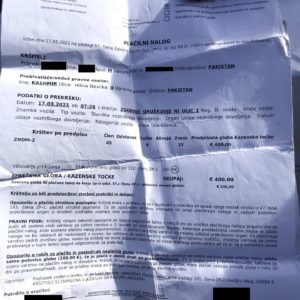On around the 4th of April, a group of people was chain-pushed back from Slovenia, to Croatia, and then to Bosnia. The group was made up of 6 males, 1 of whom was under 18, from Kashmir in Pakistan and Afghanistan. The respondent described that they had been walking for 15 days from the Bosnian city of Bihac when they were apprehended by Slovenian authorities. 3 or 4 officers took the group to a police station in Slovenia. Here, the group asked for asylum.
“I am from Kashmir, I have problem. They say you can’t stay here.”


 One of the respondents to this report had the papers he was given at the police station. One paper describes that the respondent was being denied entry to the country because he didn’t have any personal documentation. A second paper described a 400 Euro fine for having attempted to cross the border, and a third paper described how to appeal this decision within 8 days. It also described that the respondent was communicated within a language that he understood and that that language was English. The papers were in Slovenian and the respondent does not speak or understand English well enough for this to have been possible. The papers also refer to a border crossing point that is inconsistent with the information given by the respondents. This possibly indicates that a generic form is used, regardless of the location of where the apprehension takes place.
One of the respondents to this report had the papers he was given at the police station. One paper describes that the respondent was being denied entry to the country because he didn’t have any personal documentation. A second paper described a 400 Euro fine for having attempted to cross the border, and a third paper described how to appeal this decision within 8 days. It also described that the respondent was communicated within a language that he understood and that that language was English. The papers were in Slovenian and the respondent does not speak or understand English well enough for this to have been possible. The papers also refer to a border crossing point that is inconsistent with the information given by the respondents. This possibly indicates that a generic form is used, regardless of the location of where the apprehension takes place.
Of the original group that was walking together, 2 or 3 stayed at the police station when the others were pushed back.
After 4 or 5 hours at the police station, the group was loaded into a van and taken to the Croatian border. They were transferred into the custody of 5 or 6 Croatian officers. These officers were described as being dressed in black clothes with “green eyes”. This could be sunglasses or night-vision goggles.
The van arrived at the border with Bosnia, somewhat near the town of Sturlic, next to the river. They were told to put their outer clothes (leaving only one pair of trousers and a t-shirt), shoes, and bags on the fire. The officers took the phones and money from all group members. They were then beaten with a “steel stick”, so badly that one member reported having a “broken hand”. The 16-year-old group member described how the officers stood in pairs in a line. Each group member walked between the pairs and was beaten by all the officers as they passed between them. They were then sent into the river to cross back into Bosnia. The group reported knowing of a man who had previously drowned in the river at that location and was very scared.
They walked from there back to Velika Kladusa – around 20 km. The 16-year-old reported how his bare feet had become sore from the stones he had to walk on. They entered Velika Kladusa near to Miral camp.
